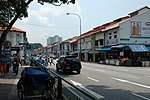The Great Madras
Buildings and structures in SingaporeHotels in Singapore
The Great Madras, formerly the Grand Madras Hotel, is a boutique hotel in Singapore. Initially a Singapore Improvement Trust block, it became the Grand Madras Hotel in 1990s.
Excerpt from the Wikipedia article The Great Madras (License: CC BY-SA 3.0, Authors).The Great Madras
Madras Street, Singapore Rochor (Central)
Geographical coordinates (GPS) Address External links Nearby Places Show on map
Geographical coordinates (GPS)
| Latitude | Longitude |
|---|---|
| N 1.30501 ° | E 103.85303 ° |
Address
Madras Street 28
208413 Singapore, Rochor (Central)
Singapore
Open on Google Maps









